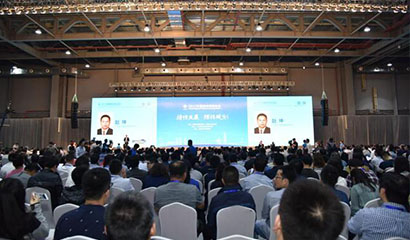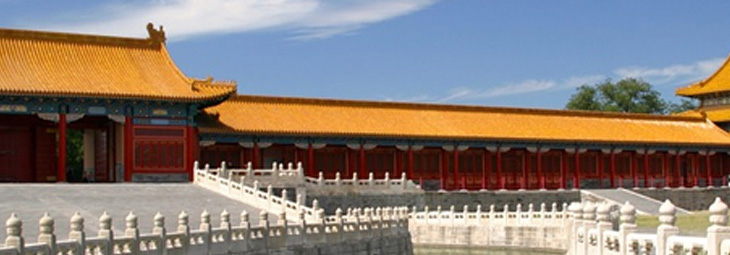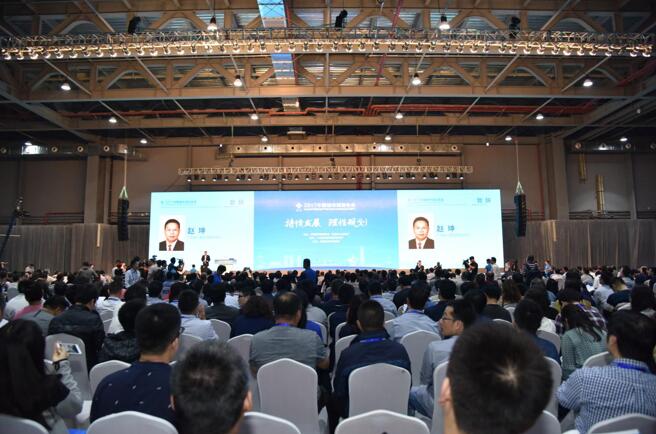



Sustainable Development, Rational Planning - Annual National Planning Conference 2017 Successfully Held in Dongguan
The Annual National Planning Conference 2017 (shortened as the Conference hereinafter) was held in Dongguan from Nov. 18 to 20. The theme of the Conference was “Sustainable Development, Rational Planning,” which aims to call on planners to better study and act on the spirit of the 19th CPC National Congress and fundamentally promote reform and innovation of the planning system. As the most participatory academic event with the widest influence and the highest authority in the field of Chinese urban planning, this is the first time that the Conference was held in a prefecture-level city. The Conference included a Plenary Session, 57 parallel sessions, and special academic dialogues, which attracted experts and scholars from home and abroad gathering in Dongguan, as well as acquiring 6,596 paper submissions in total to exchange academic ideas and discuss the development direction for the future of urban planning in China. It also opened a webcast for the first time, which received 60,000 online viewers at the peak time during the Conference.
The opening ceremony was hosted by Shi Nan, Vice President and Secretary General of the Urban Planning Society in China (shortened as UPSC hereinafter)。 Sun Anjun, President of the UPSC, Zhao Kun, Vice Secretary General of the Guangdong Provincial People’s Government, Lü Yesheng, Secretary of the Dongguan Municipal Party Committee and Director of the Dongguan Municipal People’s Congress, Ric Stephens, Chairman of the International Society of City and Regional Planners, attended and addressed the Conference. As pointed out by Sun Anjun in his speech, the Conference held in Dongguan is of special significance considering the city’s profound historical background and its miracle in reform and opening up. Meanwhile, exactly one month after the 19th National Congress, the holding of the Conference also fully demonstrates that it is an important task for planners and for the keynote of the Conference to thoroughly implement the spirit of the 19th CPC National Congress.
The Plenary Session specially invited nine experts to share keynote speeches on hot issues and difficulties confronting current planning practice in terms of concepts and methods of urban and rural planning, urban data resources, urban design development, planning ecological rationality, new urbanization, planning and development of the Grand Guangdong-Hong Kong-Macau Bay Region, global transformation, cultural confidence, etc.
Huang Yan, Vice Minister of the Ministry of Housing and Urban-Rural Planning commissioned Zhang Bing, Vice Director of the Urban and Rural Planning Department of the Ministry of Housing and Urban-Rural Development, to firstly give a speech entitled Implementing the New Era Goals, Strategies, and Tasks of 19th CPC National Congress, Changing Concepts and Methods Applied in Urban Planning, which emphasized that implementing the spirit of the 19th CPC National Congress is the mission and task of urban planning in the new era. Urban planning is bound to deepen the reform in concept, method, and institution to meet the needs of urban development and governance in the new era. The conference also invited Wang Jian, Chairman of the technical committee of Alibaba Group, to share his understanding of cities from the point of data resources, who pointed out that one of the crucial tasks for future urban planning is to optimize the allocation of public resources in cities through the application of data resources. In terms of the issue of urban design development, Wang Jianguo, Vice Chairman of the UPSC, Academician of the Chinese Academy of Engineering, Professor of the School of Architecture of Southeast University, summarized four urban design paradigms from the perspective of rational planning, and analyzed practice methods for urban design supported by data. Wu Zhiqiang, Vice President of the UPSC, and Vice President of Tongji University, stressed to support the new era planning based on ecological rationality and demonstrated the “Big Data-Intelligence-Cloud-Mobile Technology,” which provides historic opportunities for urban planning, brings forward a new perception model, showcases a diversified society, and completely breaks industrial boundaries. Yin Zhi, Vice Chairman of the UPSC, from the School of Architecture of Tsinghua University, predicted the development trends of urbanization in China and put forward missions of conception deepening, idea improving, and model upgrading for China’s urbanization in the new era. Anthony Gar-On Yeh, Director of the UPSC, Professor of the Urban Planning and Design School of the University of Hong Kong, and Academician of the Chinese Academy of Social Science, analyzed the regional division pattern of the “Front Store (Hong Kong) and Factory (Pearl River Delta) Behind” formed after the reform and opening up, and pointed out that the development of the Grand Guangdong-Hong Kong-Macau Bay Region will over time realize a shift from smart city to smart region. Pan Jiahua, Director of the Institute of Urban Development and Environment of the Chinese Academy of Social Sciences, analyzed the global development pattern and predicament and their impact on China, thus pointing out that it is necessary to focus on promoting coordinated regional development by establishing a more effective mechanism. In addition, Shan Jixiang from the National Palace Museum attended the Conference and delivered an excellent speech entitled To Establish Cultural Confidence, to Be a Loyal Watcher of Traditional Chinese Culture.
In the subsequent parallel sessions, experts and scholars provided presentations around the themes “Complex and Multi-Dimensional Urban Renewal,” “Management and Implementation of Urban Design,” “Everyone Has His Home to Live,” and other hot topics. Professor Wu Jiang, Vice President of the UPSC and Executive Vice President of Tongji University, delivered a keynote speech entitled Reflections on Urban Organic Renewal and proposed that the city is a living body, and urban renewal has always been the eternal theme of the city. In the meantime, a series of free dialogues were also held by self-application and organization, in which one of the most noteworthy statements was the speech given by Wu Liangyong, Honorary President of the UPSC, Academician of Chinese Academy of Sciences and Engineering, in Academic Dialogue 17: How to Lead and Realize the 100-Year Goal in Mega-Cities and Regions. He suggested to construct the “Beijing, Tianjin, and Hebei Region in a broad sense,” as well as to realize “inclusive” and “integrated” development by fully improving the relationship among each area. The Conference also held two events themed on the construction of the Grand Bay Area and how Dongguan could be integrated. Accordingly, Zhao Yanjing, Vice President of the UPSC, Professor of School of Architecture and Civil Engineering of Xiamen University, delivered a speech entitled Declining or Rising: Dongguan’s Crisis and Opportunities and pointed out that successful cities are not necessarily the most powerful cities, but those cities that can eventually survive. And he further mentioned that the general trend of urbanization is a shift from construction to operation, since future urban competitiveness is composed by low housing cost and the best public service.
As an academic society in the field of China’s urban planning, the UPSC has always been devoted to the growth of young talents. In the Conference, it announced the Third China Urban Planning Youth Science and Technology Award, the Ninth China Urban Planning Society Youth Paper Award, and the winners of the “Western Light” College Students Summer Holiday Planning & Design Competition. In the meantime, to mark the 40th anniversary of the City Planning Review, it also selected and honored 40 excellent papers influencing China’s urban-rural planning process in the past 40 years, hoping to motivate more planning practitioners to engage in academic research and to boost more perspective, fundamental, and original scientific papers.